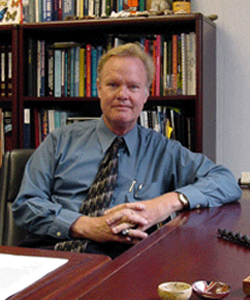Calit2 Academic Participant Among UCSD Professors Elected to National Academy of Sciences
By Kim McDonald, kmcdonald@ucsd.edu, (858) 534-7572
San Diego, CA, April 25, 2006 -- Calit2 academic participant and dean of UCSD's Division of Physical Sciences Mark Thiemens was elected a member of the National Academy of Sciences, one of the highest honors bestowed on U.S. scientists and engineers.
|
Thiemens, a chemist, is one of three UCSD faculty members newly elected to the prestigious academy. The others are Don W. Cleveland, a professor of medicine, neurosciences and cellular and molecular medicine at UCSD’s School of Medicine, and Jose N. Onuchic, co-director of the Center for Theoretical Biological Physics. They were among the 72 new members and 18 foreign associates elected to the academy today “in recognition of their distinguished and continuing achievements in original research.”
They join 63 current members of the UCSD faculty who previously had been named to membership in the academy, which was established by Congress in 1863 to serve as an official adviser to the federal government on matters of science and technology.
“The election today of these three distinguished individuals to the National Academy of Sciences underscores the continued strength and vitality of UCSD as one of the world’s great research institutions,” said Marye Anne Fox, chancellor of UCSD, a professor of chemistry and biochemistry, and a member of the academy.
Thiemens, a professor of chemistry and biochemistry, is an expert in atmospheric chemistry whose studies frequently employ rocket-borne sampling to understand the chemistry of the earth’s upper atmosphere. He received his undergraduate degree in chemistry at the University of Miami and his Ph.D. in oceanography from Florida State University. Shortly after coming to UCSD in 1980 from his postdoctoral fellowship at the University of Chicago, he made discoveries that overturned conventional theories about the formation and evolution of the solar system.
The founder and director of UCSD’s Center for Environmental Research and Training, Thiemens has done research on a wide variety of problems—from ozone chemistry to global warming to questions about the prospect of life on Mars. His most recent work has focused on understanding climate change from chemical clues embedded in the ice at the South Pole. He has twice received the Alexander Von Humboldt awards and won the E.O. Lawrence Award from the U.S. Department of Energy in 1998. In 2002, he was elected to the American Academy of Arts and Sciences.
Related Links
Mark Thiemens Website
Division of Physical Sciences


